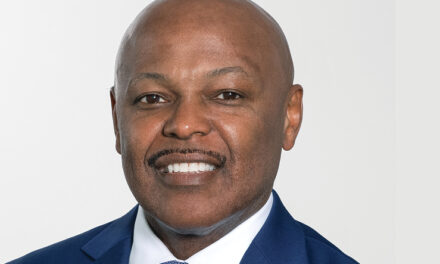


Adrian Johnson poses for a portrait at home in Decatur, Georgia, this summer. Elijah Nouvelage/Bloomberg
The green energy transition is expected to create millions of new jobs in the US and supporters say it will lift many Americans into the middle class. But an early pilot program raises questions about how much low-skilled workers will share in the boom.
Around the country, vocational schools and workforce development boards are offering training programs that promise a fast track to the jobs of the future. But clean-tech jobs aren’t yet abundant in every part of the US. And some employers say they’re looking for workers with years, rather than weeks or months, of specialized training.
Consulting giant Accenture Plc and nonprofit Goodwill Industries International, Inc. launched a pilot green jobs accelerator in four major US cities in early 2024. It trains people from marginalized groups, many of them African American, in repairing EV charging stations and installing solar panels and heat pumps. Participants were initially told they could expect a salary of around $62,000 after completion.
But several months after the pilot began, more than 60% of participants have yet to find work in the fields they trained in.
In Decatur, Georgia, Adrian Johnson said he feels “bamboozled” after failing to find work maintaining EV chargers. “I don’t have the necessary skills or training needed for any position they’re actually hiring for in the EV field,” he said.
Johnson, who is in his early 30s, enrolled after running into a rough patch financially. He had moved to the Atlanta area from Youngstown, Ohio, for a job with a wireless company and lost it shortly after relocating. He learned of the Goodwill program after visiting a local unemployment office.
Over four weeks last winter, he and his classmates learned to swap out EV charger station SIM cards, replace power modules and repair damaged cables. They didn’t learn how to install the chargers, however. That requires a journeyman electrician with four years of training.
When he showed up at the accelerator’s career day, the employers he met wanted skilled electricians, not new techs, Johnson said. He eventually landed a job inspecting properties for buried utility lines.
Nigel West, 29, was working on Goodwill’s help desk when he left that role to learn EV charger repair at the accelerator, thinking it would lead to a better-paying job. However, after graduating, the potential employers he met with didn’t seem interested in hiring entry-level technicians. He’s now back to working on a help desk for a different company.
“The need for what we were trained on is not that great in Georgia yet,” West said.
Molly Bauch, a senior manager with Accenture who administers the pilot program, said it “hurts [her] heart” to hear stories like Johnson’s and West’s. Her company and Goodwill are redoubling their efforts, she said, trying to persuade electrical, HVAC and solar firms to hire from Goodwill, which is not a traditional source for clean-tech workers, and telling those employers that they can’t keep up with America’s electrification by hiring only seasoned electricians and installers.
“We really want to get those guys placed. We won’t rest until we do,” Bauch said.
Since January, the accelerator has trained up five classes in Nashville, four in Houston and Atlanta and three in Detroit. Students in Atlanta and Detroit learned EV charging maintenance; in Houston, heat pump installation; and in Nashville, solar panel installation. About 39% of graduates have found work in clean energy, Bauch said. The placement rate rises to 58% when counting workers placed in unrelated fields. (The program’s data excludes Detroit classes.)
Even that is short of the 80% placement goal, Bauch acknowledged. She said green energy companies have assured Accenture and Goodwill they need workers with these skills.
The switch to clean energy is expected to be a jobs bonanza in time, with the Inflation Reduction Act alone expected to spawn more than 9 million jobs that last at least a year, according to the University of Massachusetts’ Political Economy Research Institute. Heat pumps outsold gas furnaces in 2022 and 2023, job growth in the solar industry is strong and the number of public EV chargers around the US is rising.
The Goodwill Clean Tech Accelerator aims to help underemployed Americans snag a share of these new jobs. Organizers hope to be in 20 locations and to have trained 7,000 people within five years.
Accelerator graduate Deserae Powell, 27, is a success story. She landed a job with Qmerit, a national electrical services firm that’s trying to win more charger installation business. She’s training to be a journeyman electrician there, a four-year commitment, because she sees good career potential.
Powell described the decision as a “one-hundred-percent no-brainer.” “I see the future of where they’re trying to head to,” she added.
Across the US, other institutions are creating pathways to entry-level green jobs. For example, Wake Technical Community College in Raleigh, North Carolina, has an EV maintenance tech course with at least 75 people on its waiting list. “I anticipate we’ll be able to fill every single class we offer,” said Rick Sapienza, dean of transportation technologies.
ChargerHelp, a California firm that’s training accelerator students in EV charging station repair, has separately rolled out an online EV charger tech course for $750 and in-person training in Los Angeles for $4,250. The company has won at least $21 million in venture capital funding. Colin Mahoney, a spokesman, didn’t speak to the job placement rate of people taking its courses but said the company works with organizations like Goodwill to help.
So far, there’s little data on job placement for such programs.
Getting people trained up in clean-tech skills is a major goal of the Biden administration. The Department of Labor steered $2 million to the accelerator’s Atlanta site through an infrastructure jobs grant program, and some accelerator partners are seeking an undisclosed amount from the program’s next round, Bauch said. Accenture put up more than $2 million, and General Motors gave the accelerator a share of a $750,000 workforce grant this year.
At the same time, companies that make and maintain the US’s EV charging station network describe a chicken-or-egg dilemma that’s plaguing the industry. Charger performance is so unreliable that drivers can’t get a good charge at a public station roughly 20% of the time, and the industry badly needs more maintenance workers. But chargers are still too scarce, especially outside California, to justifying hiring repair techs.
For now, many companies rip out malfunctioning chargers and replace them with new ones instead of doing repairs. Others use their existing journeyman electricians, said Eric Feinberg, chief workforce officer at Qmerit. Feinberg said he hired Powell and another graduate of the accelerator mostly to enroll them in a journeyman electrician program, because there’s not enough demand yet for full-time maintenance techs.
He advises people not to think a short course teaching basic skills will suffice. “They think they are going to have this great career, but I tell them it’s not like magic, where you’re going to make $50,000 a year,” Feinberg said.
There’s a similar disconnect with heat pump training. Goodwill and Accenture’s heat pump tech course is five weeks long. By comparison, the Energy Coordinating Agency, a Philadelphia nonprofit, offers a course that runs up to half a year. The group has trained a few dozen low-income students so far. “It takes three to six months to get someone to a level of competency,” said the group’s Chief Executive Officer Steve Luxton.
Organizers and partners of the pilot accelerator insist some jobs of the future can be learned quickly. BlocPower, a New York firm that specializes in energy-efficient buildings, developed the accelerator’s heat pump and air conditioning curriculum and trained students on it in Houston. It’s planning to offer similar training in other cities as the accelerator expands.
“The challenge is really convincing companies that our clients are ready to go in four or five weeks,” said Charisse Taylor, BlocPower’s head of workforce development.
Or as Bauch, the Accenture manager, asked: “Do you need an electrician to swap a SIM card?”




